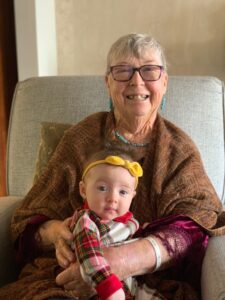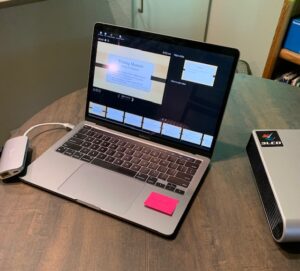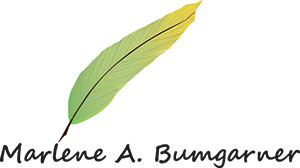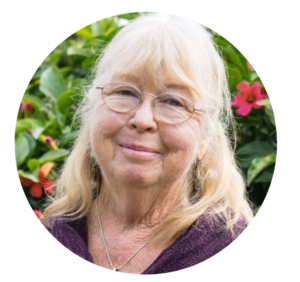Journaling as Therapy

During the months of Shelter in Place, many of us turned to gardening, baking, or writing to help us stay focused and grounded. I have done all of those things, but mostly I write. Writing is how I make meaning out of seemingly meaningless events. Journaling about Covid 19, being separated from my children and grandchildren, and the fires that threatened our safety in Santa Cruz served that purpose. Recently, I’ve been journaling about feeling frustrated and discouraged about our slow and painful return to normalcy. Social media has been full of that topic, so I know I’m not the only one feeling stymied, blocked, or depressed. (Holding my youngest granddaughter helps me feel grounded too.)
Recently I led an in-person workshop on writing memoir. Preparing for that event required that I get my data projector out of storage, learn how to use it again, and purchase several pieces of equipment to allow my new MacBookPro to connect to it (no USB port). I needed to transfer my thoughts into slides and develop a way to help the audience engage with the material. All this mechanical effort awakened my hibernating brain.
In the same way, journaling can lead to clearer thinking, and even to publication. Writers often rely on their stash of journaling notebooks to remind them of ideas they had in the past, thoughts that were fleeting and would have disappeared if they had not been captured by the pen or pencil, or keyboard.
When I am interviewed or questioned after a reading from my new memoir, I am often asked “How long did it take?” “What was your process?” “How did you remember all those details?” The answer? I began by free writing and journaling at least an hour a day. Writing memoir is an extension of journaling, and it helped me to make sense of the period of my life I was writing about. You might find that journaling helps you explore your feelings about this crazy pandemic period of your life, and perhaps even develop a memoir to share with your children and grandchildren.
Journaling to Awaken the Brain
My first step was to select a journal that felt good in my hands, opened flat, and was lined. I wanted to use a physical journal to begin my memoir project because the process of writing connects our hands directly to our brains. If you are someone who likes to sketch, you might prefer a journal that has both blank and lined pages. Drawing or doodling events from the past engages the creative side of your brain and can produce wonderful material that you can later expand upon.
Writing mostly happens in the frontal lobe of the brain. The problem is that this area is also responsible for reasoning and judgment, planning, and problem-solving. Thus, when we write in the traditional way, we tend to edit our words as we write, telling ourselves we aren’t remembering the incident correctly, or are forgetting key elements, or – worse – that no one will be interested. Freewriting, on the other hand, increases the flow of ideas and reduces the chance that we’ll censor what we write. I begin each writing session with fifteen minutes of free writing.
The process is simple – put your pen on a page in your journal and start writing. If you have something specific in mind you’d like to write about, such as a childhood incident or a happy or sad memory, just start writing about it and don’t pick up your pen for at least five minutes. Don’t worry about spelling, grammar, or punctuation. Just write. If you start out brainstorming a list of things to write about or touched on more than one memory in your free write, select one topic after five minutes, and go back to writing for another fifteen minutes. If you can’t think of anything to write, just keep repeating your subject (e.g., “Mama’s birthday,” or something like “I’m waiting for an idea to come and it will, I’m waiting for an idea to come and it will,” over and over until an idea comes. It works!).
Ray Bradbury described free writing this way: “Don’t think; just write!”
Journaling as Practice
Callum Sharp of The Writing Cooperative offers eight reasons why free writing can also help us become better writers. These five relate directly to memoir writing. Freewriting:
- builds confidence
- drives inspiration
- helps excavate emotional themes and barriers
- develops muscle memory and good habits
- generates honesty in your writing
You don’t need to attend a memoir workshop or read a book about writing a memoir to free write. You don’t even need to join a writing group. Just find a comfy place to sit and an hour a day to reminisce and write down your memories. I did this for several years before I began to structure my memoir, or do any research. Then I began to dig into family history – photograph albums, birth, death, and marriage certificates, financial records, and correspondence. I found a treasure trove of letters in a box with a ribbon around it. The contents helped me decide what part of my life I wanted to write about. Because memoir is not biography – it isn’t about your whole life, just a part of it that you want to explore and understand.
That is an important thing to remember about writing memoir. Memoir is a process before it is a product. A memoir is a historical account written by you from personal knowledge or special sources. It’s a book about a sliver of your life, a collection of memories, the lessons learned, and key moments that shaped who you are. Written by you.
In order to narrow your focus, it can be helpful to list five life-changing events that you have experienced. They don’t have to be earth-shaking – just life-changing. Like taking a math class because you liked boys, then discovering you like math (that was me, back in the days when girls were rarely seen in higher math classes). Or meeting someone who took you to a sushi bar and discovering that you loved sushi. If you’re over sixty, you probably remember where you were when President Kennedy was shot. Most of us alive today still remember where we were when the airplanes flew into the World Trade Center. Each of those was a life-changing experience.
What stories do you want to share? Brainstorm from five to ten events in your life that you remember having some kind of significance. They may or may not be related to the life-changing events you listed above. For example, a life-changing event might be the inauguration of President Kennedy, but your personal story might be about waving a tiny American flag as you stood in the freezing sleet with your sixth-grade class as Kennedy’s arcade made its way down Pennsylvania Avenue.
Select one of these events, and spend the rest of your hour writing about it. Don’t think about grammar, spelling, or how many adverbs you’ve used. Just write.
No one writes an entire memoir without doing some research, and eventually you will want to start doing some too. If you are like me, most of the source material will come from photo albums, old Christmas card lists and letters, boxed up in your garage or basement or attic, or in file cabinets you haven’t opened in years. But there are other sources of contemporary information you want to consider as well.
Did you or your parents save newspapers or magazines depicting important events? Did you keep a diary? Make memory boxes that contained the orchid corsage you wore to Senior Prom or the tickets to Phantom of the Opera at the Majestic Theater in New York? Do you keep receipts and other financial records beyond the required five years? Do you have access to birth, death, or marriage certificates, or membership in Ancestry.com? (if not, you might want to get one). Review the story you wrote during your free write – where will you go to find background material or facts to make that particular story more interesting?
Journaling as Research
Leave a blank page in your journal then list every resource you can think of that might provide insights, details, memories. Leave another blank page and think about who shared these events with you.
Who can you talk to who might help you remember details or who may know details that you don’t?
Are you still in touch with any of those sixth graders who flew with you to Kennedy’s Inauguration? Do you still communicate with the friend who double-dated with you to the Senior Prom? The ex-boyfriend who took you to Phantom (or his children)? How about Great Uncle Fred who seems like he’s going to live forever – what stories can he tell you about yourself at family gatherings? Does he know anything that you can use in one of your stories?
By working just an hour a day, you will soon build up a collection of stories. You will also start to work on your memoir in your head between sessions. Each time you open your journal you will have fresh ideas and resource material to add to your lists or to write about. Eventually, you may want to lengthen the time you spend writing, or limit your sessions to three days a week, or two, or even one. The most important thing is that you have made a start, and to keep writing.
Once you have a reasonable body of work, it will be time to start studying the memoir form, how to add interesting details, dialogue, and historical background. In a future article I will describe how I transcribed my journal stories into Scrivener and organized and compiled them into a manuscript. Once you’ve done that, you might want to find a memoir critique group — lots now meet virtually — and begin to share pieces of your story for feedback. There are many books about memoir, and many wonderful memoirs you can read for ideas. Enjoy the journey!
* * *
Was this essay helpful to you? Do you keep a journal? How do you use it? Have you ever thought of writing a memoir? Please share your ideas in the comment section.
* * *
Marlene Bumgarner moved to the California coast when her first grandchild was born and is now caring for her sixth grandchild. The author of The Book of Whole Grains, Organic Cooking for (not-so-organic) Mothers, and Working with School-Age Children, she has more recently written a memoir about raising children, animals, and vegetables on a rural plot of land in the 1970s. Back to the Land in Silicon Valley was published in 2020 and is available from Amazon.
Share this post




Marlene,
Reading your ideas and comments always makes me smile. You are so authentic in how you share and I find it so refreshing! I recently joined a small writing group in my Carlsbad community and can’t wait to share your recent article.
All my best,
Really thoughtful and well-written, Marlene!
Thanks, Erik. I’d love to read YOUR memoir!
Hello Marlene,
Thank you, for the great suggestions and sharing your writing process! This has always been a struggle for me and lately wanting to capture my “thoughts”, my experiences and the journey, the may varied paths it took for me to be HERE!
Warmly,
Consuelo
It seems like a common desire as we enter the Integrity vs Despair stage of our life. I hope I was helpful.
Hi, Marlene!
Thank you a million times for this post. I am trying to write memoir, and find myself being horribly irresponsible about it. My brain just wants to sleep, maybe because of the prolonged lack of stimulation. I remember that Julia Cameron always allowed herself one day a week to “fill the well”, and I haven’t even had one day a week, haven’t gotten out hardly at all. So – no stimulation, no writing. Thank you for all your wonderful suggestions about free-writing – sort of what I am doing right now. Anyway, thank you, friend! I see you found a way to keep yourself focused! Hope you can get up to see your family now and then. Is there any place for you to stay when you come to Santa Cruz?
Bye for now – I have to get to free-writing!
So pleased to hear from you, Dorothy!